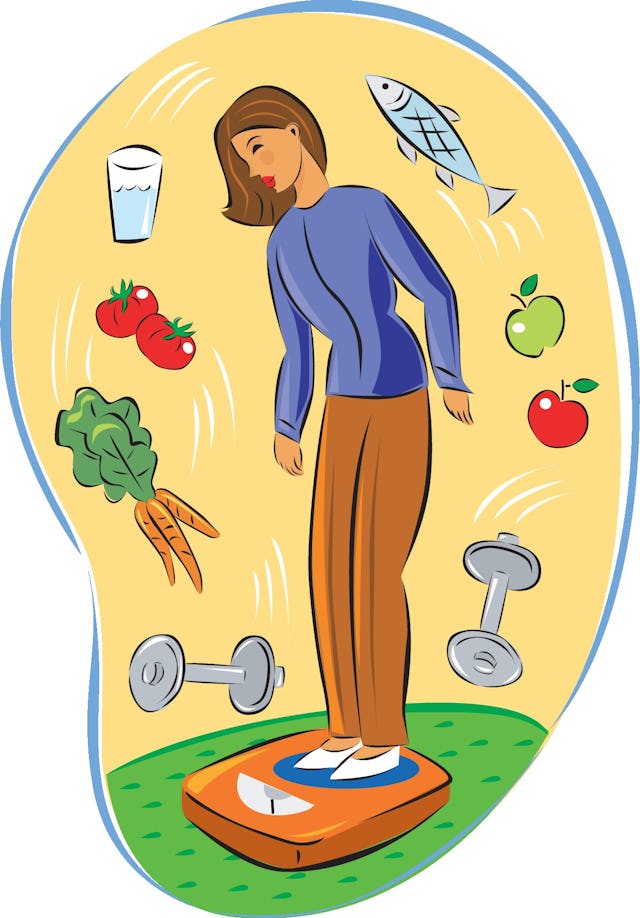We Need To Talk About The Lesser-Known Eating Disorders. Here's Why.

This is the first year that I haven’t made a resolution related to weight loss. Literally, every year has been exactly the same, make a plan, set a goal, and lose the damn weight–by any means necessary. Was I conscious about what I was eating–absolutely. Did I weigh myself several times a day? Well, not that I’d tell anyone else about. But if you would ask me if I thought I had an eating disorder? I’d laugh hysterically. How could I when I wasn’t underweight?
Spoiler alert, I was wrong. It took years to understand the fine line between healthy habits and disordered eating. And I learned that sometimes, these habits are actually symptoms of an eating disorder. Anorexia and bulimia are the eating disorders many people know about, but what about the lesser-known? We’re talking about binge-eating disorder, orthorexia, and OSFED (Other Specified Feeding and Eating Disorder).
These are only a few examples of eating disorders that aren’t talked about as often, but have equally devastating results when unrecognized and left untreated. So let’s talk about them: what they are, what symptoms you might experience if you live with these disorders, and where you can turn to for help.
Eating Disorders Look Different On Everyone
Remember when Tess Holliday spoke about her experience living with atypical anorexia and the hell she caught for it? Eating disorders are a mental health crisis that can manifest in physical symptoms. Not everyone who lives with anorexia is waif-like, and not everyone who lives with Binge Eating Disorder is overweight. Perfect examples of this are some of the lesser-known eating disorders like orthorexia and OSFED.
Orthorexia
Orthorexia is particularly devastating, in part because many of its symptoms are something diet culture glorifies. Now, there is nothing wrong with eating foods that fuel our body, but when it’s taken to the extreme, it can be a symptom of a bigger problem. Yes, toxic diet culture has gone so far as to give moral ratings to food as ‘good’ or ‘bad’. But when you only ever eat foods off of your good list and punish yourself for having something off-plan, well, that should send off a red flag. Food is undoubtedly a part of our life, but that doesn’t mean it should control our lives. When you find yourself avoiding social situations because you can’t control the food or are embarrassed to eat it in front of people, it’s something you should talk to your primary provider about.
OSFED (Other Specified Feeding and Eating Disorder)
There’s also OSFED, formerly known as ENDOS (Eating Disorder Not Otherwise Specified). According to the Center For Discovery Eating Disorder Treatment, there is a lack of understanding regarding the severity of OSFED. A common misconception about it is that it’s not severe and doesn’t need treatment.
But take it from someone who has lived with this struggle. Treatment is essential to getting better. Many of these thoughts and behaviors around food are not something that just goes away or gets better with time. Especially when we live in a society that assigns exercise, food, and different body-types moral values.
Exercise and Food Are Not the Enemies, Toxic Diet Culture Is
I’ve personally struggled with body dysmorphia, an eating disorder, and unhealthy exercise habits for the majority of my life. The truth is you never would have known it. I was an average-sized woman, erring on the curvier side. Some might have even described me as overweight at times, but never even close to looking underweight or malnourished.
But do you know what you didn’t see? The way my heart skipped a beat when I felt a dizzy spell because I hadn’t eaten all day and stood up too quickly. Or, the small notebook I kept detailing every ounce of food I ate, which always was on plan. It doesn’t make sense, right? None of that sounds like a rational explanation for anything, but that’s because it wasn’t. It was the logic of someone who needed help from a therapist and nutritionist to unlearn unhealthy eating habits.
So if any of this sounds familiar, or if you’ve ever wondered if your problems are bad enough to ask for help–this is your sign. Don’t let symptoms get so bad that you feel overwhelmed by them. Just like everything else in life, there isn’t a one-size-fits-all answer. We are all deserving of support and living a healthy and happy life.